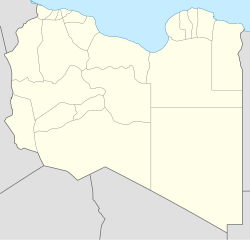Sokna (Arabic: سوكنة, IPA ['so:kna], also transliterated as Socna or Sawknah, Tamazight: Isuknen[3]) is a Saharan desert oasis town in the Fezzan region of southwest Libya.
The Eastern Berber language Sokna is native to the town. This local pre-arabized dialect, which fell out of use by the end of the 20th century, is retained in place names. Presently, the population speaks Arabic.
Geography
Sokna is located 16.5 km (10.3 mi) southwest of the district capital Hun, in the Jufra District. The natural springs support native date palm (Phoenix dactylifera) groves. Due to its reliable supply of water, it has been an important hub on the trans-Saharan route since prehistory.
See also
References
- ^ Idris, Ahmed Osman; Alhelo, Amna; ElBukhary, Hasseeb Adam; Ishag, Ibrahim Ali; Eisa, Mohamed Osman (2017). "The Study of Camel Herd Composition and Milk Yield in Central Libya". 3rd International Scientific Conference of Camel Research and Production (ISCCRP). p. 1. abstract
- ^ Amraja M. el Khajkhaj, "Noumou al Mudon as Sagheera fi Libia", Dar as Saqia, Benghazi-2008, p. 119.
- ^ Aghali Zakara, M., Allati, A., Amaoui, M., Baldi, S., Boukerrouf, R., Bouzakhar, M., ... & Fedikhi, R. (2015). La lingua nella vita e la vita della lingua. Itinerari e percorsi degli studi berberi. Miscellanea per il Centenario di studi berberi a «L’Orientale» di Napoli. Scritti in onore di Francesco Beguinot. URL :https://unora.unior.it/retrieve/handle/11574/164317/34753/SB4.pdf

